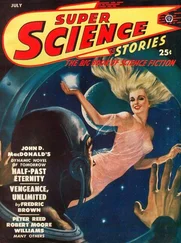“You have quite an imagination.”
“I have none. I never believe anything I don’t see. That’s maybe why I do good at this business.”
“Maybe I was afraid Kruslov was aiming at me, Mr. France.”
“Was that all?”
“I don’t see how it could be anything else, do you?”
He smiled at me. I did not like his smile. There are certain sharp-toothed tropical fish that wear that same smile all the time. He went back toward the house. He wore a rumpled blue suit that looked too big for him. I watched the way he moved. Bullfighters move that way, and very good dancers, and top ring professionals. I was glad he had broken off the conversation, he made me uncomfortable. I was particularly glad I hadn’t killed her. France had a certain gothic menace about him. And his eyes were as wise and ancient and knowing as those of a great lizard.
It was ten of six when I turned into the plant road. Just as I made the turn the black sky opened and the rain sluiced down, lifting a six-inch fringe of silver off the asphalt, so heavy that the wipers were useless. As I crept cautiously along I saw Toni MacRae, distorted by the windshield water, galloping along the side of the road toward the bus stop, holding her purse over her head. The rain had caught her midway between the plant and the bus stop shelter.
She ran girl-fashion, knees in, heels kicking out, hips switching. It is awkward, and sometimes ludicrous, often charming. There seems an unpleasant distortion about any girl who runs as a boy runs.
I swung the car door open and yelled at her. She ran for the car, grabbed the door handle, swung herself in and plumped down on the seat, slamming the car door in the same motion. She was panting and she smelled of damp cloth and damp girl.
“Glub,” she said.
“Bad timing.”
“Another fifty feet and I could have stopped running. It wouldn’t have made any difference then. I thought I could make it to the shelter before it hit. Bad guess. Gosh, I’m soaking.”
The jumper was a darker blue and a closer fit. The white blouse showed pink where rain had pasted it to her arms. Her hair was fairly dry right on top, but the ends were drenched. At the plant I swung around and headed back out toward the road.
“This time I get to take you home,” I said.
“This time,” she agreed. It was a standing argument between us, her not letting me drive her to or from work. She lives in a rooming house at 985 Jefferson. My apartment is at 989, just two doors away. I hadn’t known she was in the neighborhood until I had seen her one Sunday afternoon at the corner store. Then she told me the story. Her father lives with his second wife on the other side of town. He stayed single for several years after Toni’s mother died, and then married again. The house is small and there was a new crop of children. Toni moved out, with no ill will on either side. It was a question of space, primarily.
“Is there anything new about Mary Olan?” she asked.
“They found her body. She was strangled. They found the body north of here, in the woods.”
“How awful!” Toni said. “How perfectly dreadful! Who did it?”
“They don’t know. They think a handyman named Yeagger did it.” I told her why they thought he might have done it.
She sneezed three times, making of each small paroxysm a delectable thing indeed. I turned on the car heater. She pulled off her sodden shoes and curled nyloned toes in the direct heat.
“Poor Mary Olan,” she said.
“I don’t know, Toni. I really don’t know. She had health and money and position. But she didn’t seem to be having a very good time. She wasn’t enjoying herself. She had a set of demons riding her, making with the spurs and flailing the whips.”
The rain slackened a bit but as I turned into our street it came down again harder than before, making floods in the gutters and a metallic hammering on the car roof over our heads, turning the car into a small isolated world. I parked in her driveway, and when she reached for the door handle I said, “Relax a minute. It’ll ease up. No need to get a worse soaking. I’ve got no place to go.”
We sat there in the rain. Slow traffic crept by, headlights shining. I said, “I’ll start this old phonograph record again. Why can’t I drive you to work and back. You’d save money and you’d get fifteen extra minutes sleep in the morning.”
She smiled at me. “You could almost sell me on that sleep thing. But no, Clint. Thanks, but no.”
It irritated me a little, because of the inference that I made the offer with ulterior motives. “Why not?” I asked, too harshly over the tin drumming of the rain.
“Strange things happen to the local C.P.P. girls who date the fair-haired boys who get shipped in here, Clint. They seem to get fired, and I like my work. Any more questions?” She had matched my harshness with her anger.
“Just a ride to and from work. What’s wrong with that?”
She looked at me speculatively, lips pursed. “Just a ride. That’s it, isn’t it? For now. Be practical, Clint, please. We’re both lonely. I’m aware of that and I guess you are. Just a ride, to work every morning and home every night. And every night I get out neatly and say thanks. Is that what you think? How soon before we’d stop on the way home? Just a cup of coffee, Tina. Sure. Later a steak. Fine. No, Clint. We keep this formal. We work in the same office. That’s all and that’s all there will be, because I like you too much already.”
She had worked her feet into her damp shoes while she spoke. She opened the car door and was gone, running through the rain, up onto the front porch of the old yellow house. She gave a shy wave and went inside.
I forgot everything else she said and remembered only that she had said she liked me too much already. It was the first chink in cool armor. I suspected that she had said it impulsively and would be sorry later. Tina was not one to plot, to connive a chance to say a thing like that.
I went home and thought about her, about long quick legs and the tilt of her smile, about eyes that held gravity and shyness.
My local sonorous evening commentator said in part, at ten o’clock that evening, “Chief of Police Judson Sutton told your reporter earlier this evening that he expects an early solution to the brutal murder of Mary Olan. Rain and darkness prevented as thorough a search of the area where the body was found as was desired. The roped off and guarded area will be searched again in the morning in the hope that some clue can be found that will point to the identity of the murderer.”
I hoped they would not look in any holes in rotten birch trees.
“Earlier today Nels Yeagger, handyman at the Pryor estate at Smith Lake was brought down to the city for questioning. He was picked up by two of the men assigned to Captain Kruslov, who is handling the case personally. At the time of this broadcast Yeagger has not yet been released, and it is assumed that he is still being interrogated.
“The coroner’s office, after an examination of the body, has established the time of death as some time between two A.M. and five A.M. Sunday morning. Death was caused by a thin band of fabric that was tightened around the throat. There is no indication that the fabric was knotted. Coroner Walther stated that the object used could have been a belt used as a slip noose. The actual throat injury was slight, and it is believed that strangulation took place slowly. The absence of any marks of conflict on the body seem to indicate that the girl was unconscious at the time she was killed. She had not been criminally attacked. The body was taken to the place where it was found in a car, and the tire marks were carefully obliterated where the car passed over soft bare ground. An extremely valuable wristwatch had not been removed from the body, and police have eliminated robbery as a motive, despite the fact that the dead girl’s purse has not yet been found. At the dinner party before her death she was carrying a small black envelope purse with a gold clasp. She...”
Читать дальше
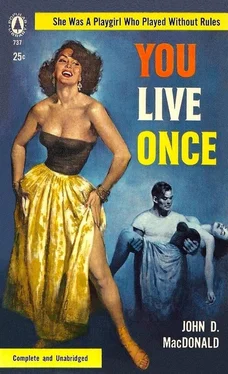
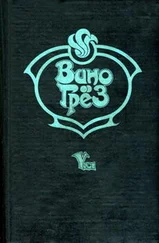
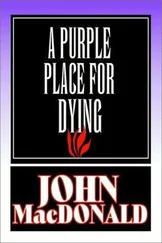
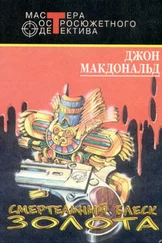
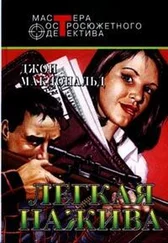
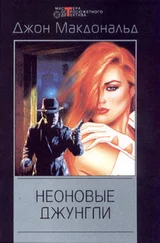
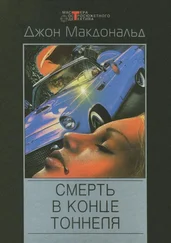
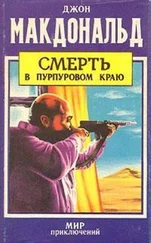
![Джон Макдональд - Wine of the Dreamers [= Planet of the Dreamers]](/books/430039/dzhon-makdonald-wine-of-the-dreamers-planet-of-thumb.webp)
![Джон Макдональд - Finding Anne Farley [= Ring My Love with Diamonds]](/books/430180/dzhon-makdonald-finding-anne-farley-ring-my-lov-thumb.webp)

